She can accurately fire a pistol over her shoulder while riding a motorcycle between two semi-trucks full of spy robots.
No problem.
She can fling a knife across a room and knock the earring off the Big Boss of the major corporation that has been secretly ordering the assassinations of international political figures.
Piece of cake.
She can wield a flamethrower the size of a Prius while biting out the word “fuck” and lighting a cigar, her boot firmly planted on the jugular of the man she just finished beating up for calling her a girl.
Easy.
But what to wear?
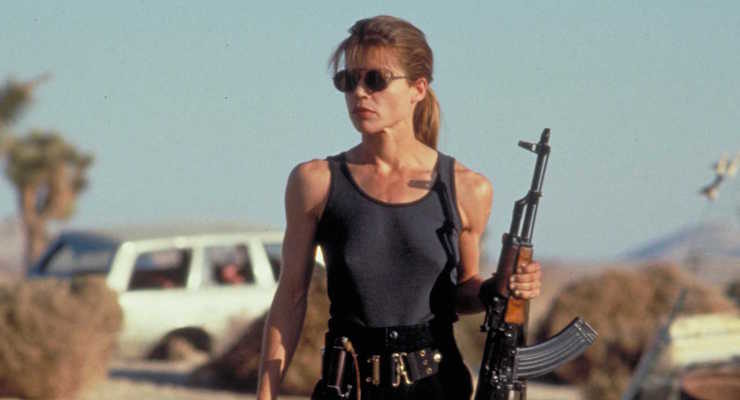
If the path walked by the Acceptable Woman is, by design, a narrow one, then the path walked by the Badass Woman is a tightrope. Like the Acceptable Woman, she must not be too interested in the way that she looks (but she must still look good [but she must not try to look good]). Like the Acceptable Woman, she must be sexually enticing, but not sexually available.
The Badass Woman has an extra layer of complexity, and thus an extra layer of constraint. Her complexity, if left unchecked, becomes threatening—thus, because she is allowed to be tough, she must also sacrifice emotional availability. Because she is allowed to have skills, she must be a little less pretty.
This poses a serious problem. The Badass Woman must still be an Acceptable Woman, which means that she must be consumable—must still look beautiful, or at least approachable, in promo shots and commercials. This by itself isn’t difficult to accomplish: it’s not a challenge to find a pretty actress, and there is an entire interlocking kingdom of industries dedicated to the maintenance and production of attractive women.
But the audience has to know that the very pretty woman they’re rooting for isn’t pretty. They must be made to reject the evidence with which their lying eyes present them.
Enter the costumer.
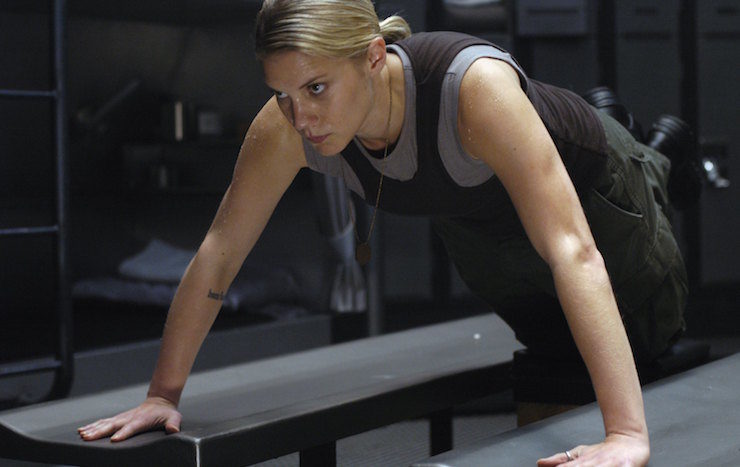
Enter the black tank top.
The black tank top is a simple garment—unisex, unstructured, comfortable. It doesn’t show blood or sweat easily. It comes in a three-pack. It’s ostensibly incredibly practical.
Ostensibly-Practical, in the language of women’s costuming, can be a useful indicator of not-pretty. House dresses, curlers, oversized glasses, and paint-splattered aprons are all examples of this philosophy: women dressed not as tableaux, but as active people in the process of living their lives, are presented as unfinished products. These are women in a state of shabby uncaring; if they are not invisible to other characters, then they are actively disgusting.
This is ideal for the Badass Woman. A black tank top is as ostensibly-practical as one can get. It’s still flattering, but it’s not pretty. It’s simple.
It’s the perfect costume for a tightrope walker.

The un-prettiness of the black tank top reminds the audience of the choice the Badass Woman has been required to make; it’s a choice between tough and feminine. In a society that places strict boundaries around femininity, this character has chosen to root her identity in “Badass” rather than “Woman,” and as such, she is required to eschew society’s acceptable markers of feminine expression. Lipstick? Out. Hairstyles? Practical, or none at all. Emotional connections with other people, especially with other women? Never.
Fashion?
Don’t make her laugh.
She’s made a choice. She chose to put on the uniform of Rambo and Blade and John McClane, men who were forced by circumstance into the role of Action Hero. The Badass Woman has chosen that uniform, and the black tank top is a signpost that points the audience’s assumptions to that choice and its consequences. We are admonished: this character has chosen to turn away from Womanhood, so anything that happens to her is her own fault.
The female viewer is warned by the black tank top: If you chose wrong, all of those bad things could happen to you, too.
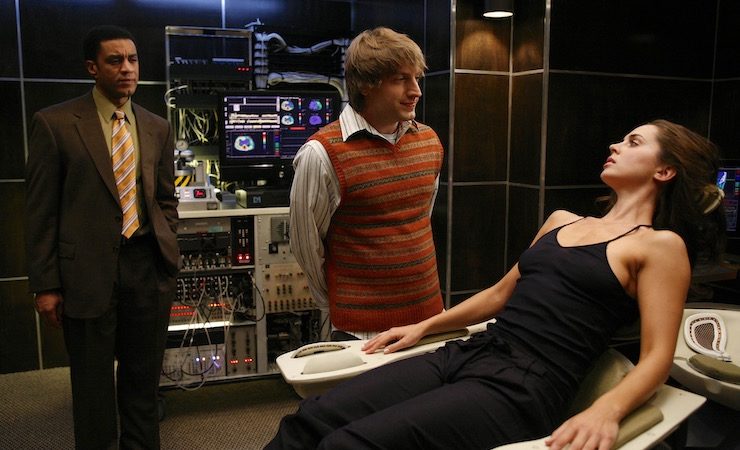
Why specifically a black tank top? Why not a black moisture-wicking cargo-pocketed unitard or a tactical turtleneck or even a black t-shirt? A tank top doesn’t offer protection to major arteries, doesn’t insulate against the elements, doesn’t even prevent mosquito bites. Why on earth would any action hero choose to wear a garment that leaves her so exposed?
This is the final deft turn performed by the costumer. Remember: the Badass Woman is required to be un-pretty, but she must still be consumable. She is required to be tough, but she must still be sexy. The black tank top, as practical as it is, renders the Badass Woman vulnerable. That vulnerability is the access point provided to an audience that consumes via their gaze: the Badass Woman is tough, and you can’t beat her, but as a viewer you can still have her. You can still see her weak spots—her throat, her underarms, the nape of her neck. She may be enigmatic, the black tank top says, but she will never be hidden from us. She may be tough, but she is not protected.
Thanks to the black tank top, the Badass Woman is still ours to possess. No matter how many bad guys she punches, no matter how many bullets litter the ground at her feet. No matter how many cigarette butts she spits out in order to swear more clearly.
Because of that black tank top, she’s still ours.
 Sarah Gailey’s fiction has appeared in Mothership Zeta and Fireside Fiction; her nonfiction has been published by Mashable and Fantasy Literature Magazine. You can see pictures of her puppy and get updates on her work by clicking here. She tweets @gaileyfrey. Watch for her debut novella, River of Teeth, from Tor.com in May of 2017.
Sarah Gailey’s fiction has appeared in Mothership Zeta and Fireside Fiction; her nonfiction has been published by Mashable and Fantasy Literature Magazine. You can see pictures of her puppy and get updates on her work by clicking here. She tweets @gaileyfrey. Watch for her debut novella, River of Teeth, from Tor.com in May of 2017.










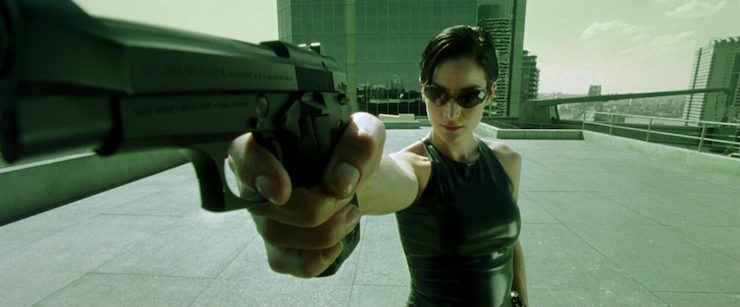
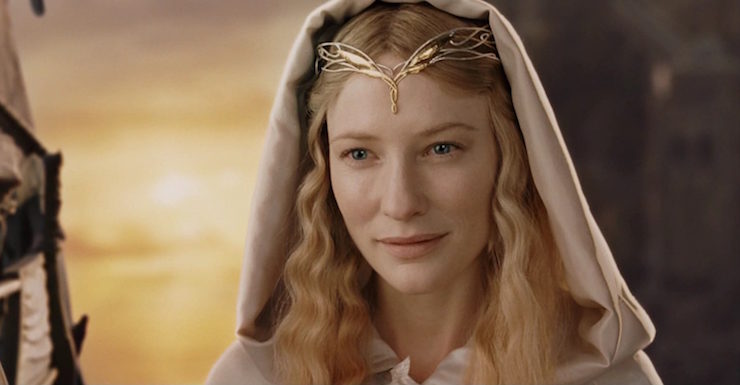
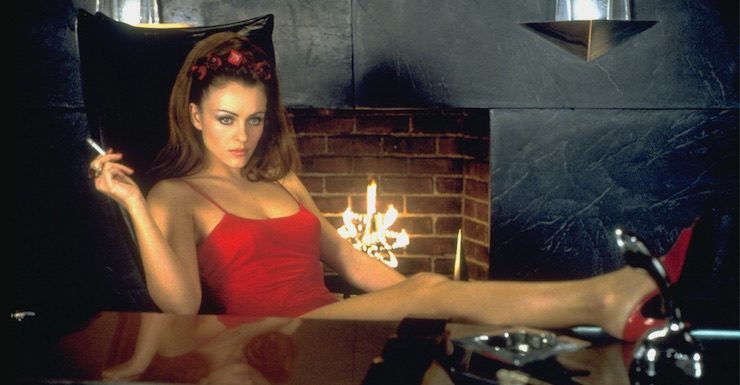

You missed someone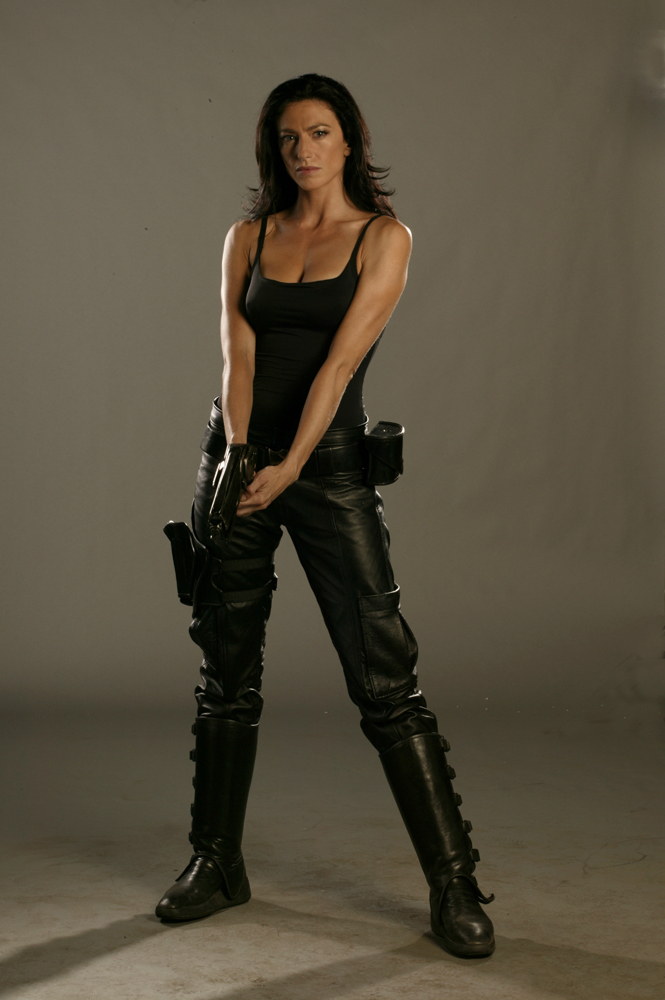
I’m pretty sure the male pilots in BSG wore tank tops too.
Called the tank top because tankers in WW2 wore them, for reasons of comfort.
How did I never notice this trend before?
My favourite is Rita Vrataski from All You Need Is Kill/Live Die Repeat/Edge of Tomorrow.
#1: Yes! Never leave out aeryn sun.
I wouldn’t consider the black camisole like the one worn in DOLLHOUSE (the final image in the article) a black tank top. The straps are too slender which allows a bit more breast to show as well as offering the temptation of it slipping to show even more, and it’s shaped to show the breasts.
Well, it’s better than high heels or something, I guess sometimes they do both, but they will be heeled boots for the tough woman to go with her tank top.
I don’t think this will be solved in my lifetime or if it needs to be. Some people like to feel as if they look good, even if they aren’t going for max. That’s why so many people are just kind of meh.
This is one version of meh, but put on a pretty lady raises it above the average, so you are back to the Hollywood issue that only pretty people (men and women) can appear in movies.
This series is interesting. Do you intend to talk about men’s and children’s clothing too at some point? I’m wondering if their outfits are as codified as women’s.
I always loved the costuming in Haywire for this reason. I saw a brief clip once showing the super-spy-fighter heroine in an ill-fitting hoodie and thought… wait a minute, that’s not allowed! :-) So I watched the whole thing (I enjoyed it) and she goes through tons of costume changes that are all plot appropriate, tends to wear layers and even in tropical settings she wears a *t-shirt* not a tank top. Thanks for helping me put a finger on why I liked Haywire’s costuming so much! :-)
@2
It comes from the “tank suits” men and women used to wear while swimming in the 1920s. Tank crews wore coveralls or specially designed uniforms. They wore standard T-shirts since the “tank top” wasn’t in the supply system. They may or may not have cut the sleeves off, but I’ve never seen a picture of a tank crew wearing them.
This is quite off-topic but I got earwormed while reading this and I don’t see any reason to spare the rest of you.
@7 Athereen I too would like to know what the male equivalent might be…
And here is Faye from Mirror’s Edge for another example :)
I think the male equivalent is the white tank top as popularised by John McClane.
What a curious definition of acceptable behaviour.
This is pretty interesting and insightful.
I agree with the person who asked if this type of analysis might be applied to men and children – such would be equally interesting. Also, it would interesting to simply analyze costumes for women over the past decade as compared to earlier decades. For example, this comes to mind when I think of the way women have been dressed in the two Star Wars movies, versus the prequels, versus the original trilogy.
How about Captain Janeway?

In terms of costuming, I’ve always felt that Star Trek: Voyager got way better when Seven showed up because then the writers stopped muddling up the Janeway character so badly. (Is she a maternal figure today? Chakotay’s love interest? Bitchy commander?) It’s like Seven allowed them to say, Okay! We can let Janeway be Janeway now. Seven is the sex object in the requisite skin tight clothes. (That said, I ended up liking Seven a lot too.)
Which brings me to answer to the previous comment about women in previous decades… there was a very long run of sci fi females shaved bald at some point. Early eighties?
Others I can think of who rock the black tank top look include both Root and Shaw in Person of Interest.
And while the original Sarah Connor is included in the article, it’s worth remembering that in the too-short-lived spin-off, The Sarah Connor Chronicles, both Sarah and Cameron ran the gamut of shades from black to white, via grey for their tanktops…
#5, I agree, a camisole is different from a tank, and has different meaning, it does highlight the shape of the breasts more. It has as its roots silk underwear as opposed to combat or athletic clothing.
#13 Acceptable for who? The whole point of the trope is to accentuate the Badass-ness of the character. None of the behavior is acceptable in polite society, which is why these women have left the the party. I also don’t agree that the B woman doesn’t get to have emotional interaction, it just isn’t always in the normal pattern of what we consider feminine emotional behavior. Women get emotionally attached in action films at least as much as men, (which isn’t saying much, I know). I think also that often part of the character development of the female action hero is how she manages contrary expectation to her outside-of-the-norm behavior.
Let’s not forget Ripley started the trend in Alien. The first bad arse woman in a lead role battling to save her crew and humanity.
I came here for Sarah Connor (interesting tidbit – I grew up on a VHS we had of Terminator 2 in my formative years, and never even saw the first Terminator until I was an adult. So I never knew Sarah Connor as anything but a complete badass) and stayed for the insight – I think you hit the nail on the head regarding the costuming intended to send the message that the woman is both badass but also ‘consumable’. Then again, in some ways all visual media involves us ‘consuming’ the actors/actresses in some way (which is not to say that the dynamic regarding how women are treated is much different).
Fascinating. It’s all the more ironic when you consider that these kinds of shirts are called WIFEBEATERS
…really
The stereotypical “wife-beater” undershirt is white, though. The term comes from a widely publicized 1947 photo of a murder suspect in a stained white sleeveless undershirt. https://www.dictionary.com/e/take-off-wife-beater-put-tank/